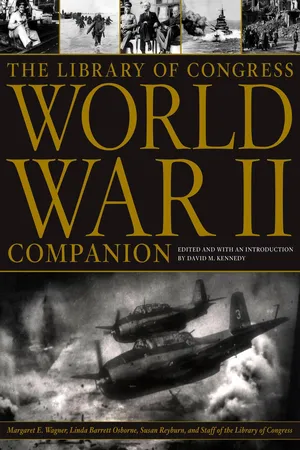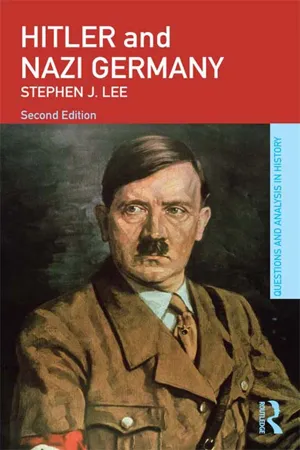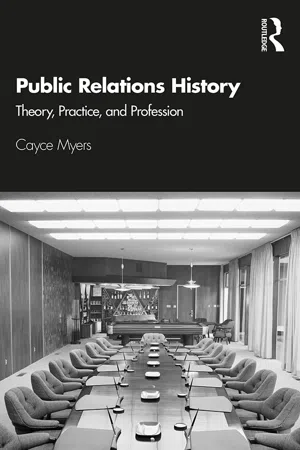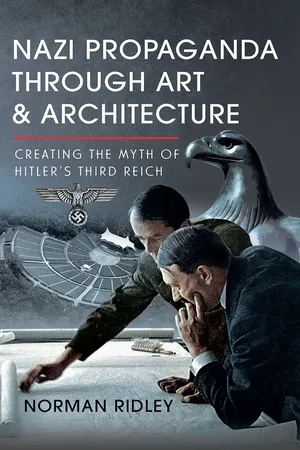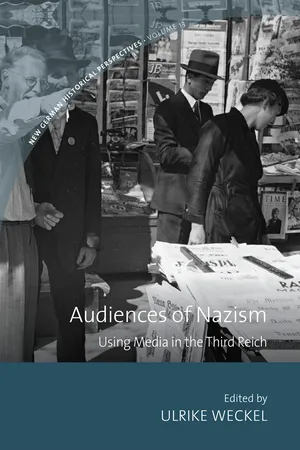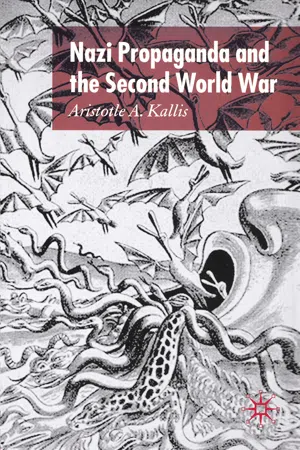History
Joseph Goebbels
Joseph Goebbels was a prominent figure in Nazi Germany, serving as the Minister of Propaganda under Adolf Hitler. He was known for his skillful use of propaganda to manipulate public opinion and promote Nazi ideology. Goebbels played a key role in shaping the narrative of the regime, using media and communication to spread anti-Semitic and nationalist messages.
Written by Perlego with AI-assistance
Related key terms
1 of 5
8 Key excerpts on "Joseph Goebbels"
- eBook - ePub
- David M. Kennedy(Author)
- 2007(Publication Date)
- Simon & Schuster(Publisher)
Reichsministerium fur Volksaufklarung und Propaganda, or RMVP). Joseph Goebbels, the Nazi’s premier propagandist, directed this ministry. He had served as the Nazi gauleiter (regional political leader) of Berlin since 1926 and was elected to the Reichstag in 1928, under the Weimar Republic. Goebbels worked assiduously against the Weimar government and for Nazi control. He believed that propaganda was the necessary link between the people and the government, and that it guided them toward a complete commitment to the goals of the state.Joseph Goebbels, Reich Minister for Public Enlightenment and Propaganda, speaks during a book burning in Berlin, May 10, 1933. Courtesy of National Archives and Records.Goebbels was enormously skilled at manipulating facts and information to fit the Nazi view. “Neither the amount of news communicated matters nor the speed with which this is done,” he said of the newspapers the state controlled. “The only thing which does matter is making German readers absorb a particular viewpoint. No announcement should be published as it stands. Make-up, headline or comment or all three should be designed to arouse in the reader the particular reaction at which, in conformity with government policy, the editor is aiming.” He attributed the Nazis’ success in gaining supporters to the use of “clever psychology and a pronounced ability to sense the thinking processes of the broad masses of the population.”Goebbels staffed the RMVP mainly with young, educated, and dedicated Nazis. Its departments included administration, propaganda coordination, radio broadcasting, press, foreign press (not established until 1934), film, theater, and music, fine arts, and folk culture. The RMVP formulated policy in each of these areas. Its role was to centralize control of the media and to provide content reinforcing Nazi precepts. It was funded by the sale of radio licenses, the number of which rose steadily as people bought more and more radios. Regional RMVP offices operated throughout Germany. - eBook - ePub
Hitler, Stalin, and Mussolini
Totalitarianism in the Twentieth Century
- Bruce F. Pauley(Author)
- 2014(Publication Date)
- Wiley-Blackwell(Publisher)
Mein Kampf, written at a time when he was not allowed to speak publicly, was his only important publication. His speeches were not without faults. They were too long, repetitious, chaotic, and full of contradictions. But these drawbacks were overshadowed by the emotion and compelling conviction that they aroused. He seemed to know instinctively how to tell every audience exactly what it wanted to hear. In this respect Hitler was without peer. He was phenomenal, especially because Germany was not a country with a great tradition of oratory.The task of Nazi propaganda became a good deal easier after the party’s takeover in 1933. Within a few weeks there were no more opposition newspapers or public speakers to challenge and contradict Nazi assertions and allegations. The government-owned and -operated radio station was now a Nazi monopoly and was frequently used by the Führer. But most important, Hitler was now the chancellor and could make policy, not merely talk about it. Like any incumbent politician, his words now had to be taken seriously.In March 1933, just six weeks after seizing power, Hitler established the Ministry of Popular Enlightenment and Propaganda, headed by Josef Goebbels, who had been in charge of Nazi propaganda during the Kampfzeit. Many commentators have noted that Goebbels was devoid of inner convictions. He simply knew how to display the convictions of others. His cynicism, however, seems to have stopped short of Hitler. Goebbels was one of the few Nazi leaders to commit suicide, along with Hitler, in the final days of the Third Reich.Goebbels was actually a more polished speaker than Hitler, and his intellectual skills proved to be his most important asset. Unlike his master, who thought that the importance of propaganda would decline after the seizure of power, Goebbels believed that it would still be necessary to mobilize support and maintain enthusiasm. Probably his most important achievement was the creation of a semireligious myth of an infallible German messiah, which forged an extraordinary bond of loyalty between the masses and their Führer.Goebbels controlled the news by holding daily press conferences at the Propaganda Ministry where editors were told what to write, although they were given some leeway in how they wrote, so as to avoid obvious conformity and monotony. Thus, German (and also Italian) newspapers were manipulated, but unlike those of the Soviet Union they were not nationalized. Goebbels’s ministry also demonstrated the close connection between propaganda and culture; after September 1933 it included a Reich Chamber of Culture, which was subdivided into chambers not only for the press, but also for broadcasting, literature, theater, music, film, and the fine arts. In his control of German culture, Goebbels was guided by his personal conviction that propaganda was most effective when insidious, that is, when its message was concealed in popular entertainment. He knew that once propaganda was recognized as such it lost its effectiveness. When he occasionally departed from this ideal and used “hard sell” techniques, the attempt usually failed miserably. The entertainment content of the Nazis’ propaganda after their takeover of power can be seen in elaborate ceremonies honoring Nazi martyrs, marching songs (which replaced hymns), and festivals commemorating great Nazi events (which replaced religious holidays). - eBook - ePub
Nazi Propaganda (RLE Nazi Germany & Holocaust)
The Power and the Limitations
- David Welch(Author)
- 2014(Publication Date)
- Routledge(Publisher)
But his task as a historian is neither to condemn nor to justify: it is merely to explain. Condemnation and justification may be signs of moral strength, even acts of moral bravery, but they are also acts of historical cowardice for they stand in the way of historical explanation. While the literature on Goebbels is rich in examinations of the psychological consequences of his physical disabilities, or in anecdotes about the lengths to which his Ministry went to conceal his limp from the general public (and here Goebbels had something at least in common with the perceived arch-enemy Roosevelt!) it is much thinner indeed on serious scholarly attempts to explain precisely what Goebbels thought he was doing. Even the best works on Nazi propaganda, such as Herzstein’s The War That Hitler Won, 11 or Heiber’s introduction to the two-volume German edition of the speeches, 12 do not, in the final analysis, really confront the fundamental question that a historian must ask about Goebbels and his role in the Third Reich. That question is, quite simply: what, as Reich Minister for Popular Enlightenment and Propaganda, was Goebbels’ view of the political function of propaganda in the National Socialist system of government? Any historian has to face the difficulties involved in separating fact from fiction. The historian of propaganda confronts the added problem of distinguishing fact from propaganda and in the case of Goebbels this problem is particularly acute. The source materials available to us are limited: the destruction of the Propaganda Ministry building in Berlin by RAF bombing in late 1944 has deprived historians of what would have been a veritable treasure-house of material. Such Propaganda Ministry files and records as do survive are either fragmentary, such as those in the Bundesarchiv in Koblenz, 13 or inaccessible (at least to Western historians), such as those in the Zentrales Staatsarchiv der DDR in Potsdam, or both - eBook - ePub
- Stephen J. Lee(Author)
- 2013(Publication Date)
- Routledge(Publisher)
Indoctrination and Propaganda
DOI: 10.4324/9780203717851-4Background
Indoctrination and propaganda were the means by which the Nazis aimed to secure voluntary support for the new regime; coercion and terror were reserved for those individuals or groups who failed to respond or who were not included within the scope of the People’s Community or Volksgemeinschaft. The former process was dominated by Joseph Goebbels, the latter by Heinrich Himmler (see Chapter 5 ).Goebbels had started his political career as Gauleiter of Berlin in 1926, progressing to Party Reichspropagandaleiter from 1929. After the rise of the Nazis to power, he made a considerable contribution to the process of Gleichschaltung in the administration (see Chapter 3 ) and headed the new Ministry of People’s Enlightenment and Propaganda. This took over various functions of other Ministries, especially the Interior, its task made easier by the nazification of the civil service and the imposition of controls on the media. Goebbels made his overall intention clear from the start. He told a press conference on 15 March: ‘It is not enough for people to be more or less reconciled to our regime, to be persuaded to adopt a neutral attitude towards us; rather we want to work on people until they have capitulated to us, until they grasp ideologically that what is happening in Germany today not only must be accepted but also can be accepted’.1 He also emphasised the need to take full advantage of the latest technology in order to achieve maximum saturation to create complete loyalty and subservience.This chapter looks at the impact of his policies on youth and the remainder of the population. The former were subject to the dual impact of educational changes from the Ministry of Education under Bernard Rust, and the initiatives from the Hitler Youth headed by Baldur von Schirach. Analysis 1 considers the extent to which the Nazis succeeded in their efforts to transform the curriculum and teaching methods, as well as the administrative conflicts between the Ministry of Education and the Hitler Youth movement. The latter had been established within the Nazi movement in 1926 and, for a while, had to compete with rival organisations set up by the Catholic Church and the Centre Party, the Communists and Social Democrats on the left and the DNVP on the right; this was in non-political youth movements. By 1933 the Hitler Youth was still in a minority but the banning of other groups soon inflated its numbers. In 1939 all Germans between the ages of 10 and 18 were compulsorily recruited. Below the age of 10 boys joined the Pimpf, between 10 and 14 the German Young People (Deutsches Jungvolk or DJ) and from 14 to 18 the Hitler Youth itself (Hitler Jugend, HJ). The equivalent for girls between 10 and 14 was the League of German Girls (Jungmädelbund or JM) and League of German Maidens (Bund Deutscher Mädel, BDM). Analysis 1 - eBook - ePub
Public Relations History
Theory, Practice, and Profession
- Cayce Myers(Author)
- 2020(Publication Date)
- Routledge(Publisher)
In no degree was the Committee an agency of censorship, a machinery of concealment or repression. Its emphasis throughout was on the open and the positive. At no point did it seek or exercise authorities under those war laws that limited the freedom of speech and press. [original capitalization and italics]6Conversely, in Germany, the term propaganda had a neutral meaning prior to World War II, and it was only after the rise of Joseph Goebbels as the Reich Minister of Propaganda that the term became associated with manipulative communication practices.7 Goebbels was keenly aware of public opinion and how media in all forms, such as film, radio, and newspapers, created shaped people’s attitudes and beliefs. In an early meeting with the German press on April 6, 1933, Goebbels said, “Public opinion is made and those who work at forming public opinion take upon themselves an enormous responsibility before the nation and the whole people.”8 Later, in 1965, Edward Bernays, the famous American PR practitioner, even claimed Goebbels used Bernays’s 1923 book, Crystallizing Public Opinion , to influence German public opinion.9The Study of Public Opinion
Propaganda and public relations are inextricably linked to the rise and formalization of the study of public opinion. The recognition of public opinion and its importance to society began in the nineteenth century. There was awareness of the power and problems of public opinion as evidenced in Hugh Smith’s (1842) address entitled “Theory and Regulation of Public Sentiment” at Columbia College on public opinion. In his address, Smith, the Rector of St. Peters Church in New York, detailed the malleability of public opinion, and the inherent deception that comes with the perception of public sentiment.10 In 1861, a series called Public Opinion was published in London, covering thoughts and opinions about current events.11 However, it was French sociologist Gabriele Tarde’s work, notably Les lois d’imitation [The Laws of Imitation], published in 1890, and Les lois sociales: Esquisse d’une sociologie [Social Laws: An Outline of Sociology], published in 1898, that was a watershed moment for public opinion scholarship.12 Tarde’s development of psychology, which focused largely on criminology and social behavior, provided a basis for the scholarship of Gustav Le Bon’s 1895 book The Crowd: A Study of the Popular Mind , which was widely read and translated.13 Le Bon was a French doctor who wrote extensively about socio-psychological issues. In his book, Le Bon argued that crowd have certain characteristics that make it take on its own crowd psychology or “mental unity.”14 - eBook - PDF
Nazi Propaganda Through Art and Architecture
Creating the Myth of Hitler's Third Reich
- Norman Ridley(Author)
- 2024(Publication Date)
- Frontline Books(Publisher)
More than 1,500 others fled the country, leaving the industry without many of its leading lights. Desperate to halt the exodus, when Goebbels was faced with losing so many Jewish directors such as the Jewish Fritz Lang, he famously said, ‘I’ll decide who’s Jewish’. 3 He offered Lang the position of Head of the German Film Studio, UFA. Lang demurred then fled the country on 31 July 1933. Clearly for Goebbels, propaganda was as much to do with what the people did not see or hear as much as what they were spoon-fed. Censorship was a vital component of his strategy. Initially, the Nazis used existing regulations to control artistic expression, especially in the film industry, but they soon wanted more powers and brought in the Reichsfilmgesetz (Reich Film Law) on 16 February 1934, designed to take thematic control of the German film industry. Amongst other things it required new film scripts and cast lists to be handed to the Goebbels- controlled Reichsfilmdramaturg (National Film Dramaturgists) before NAZI PROPAGANDA THROUGH ART AND ARCHITECTURE 132 any work could begin, and people employed in the film industry were obliged to attend classes at the Nazi Film School. In the context of film, Goebbels was particularly conscious of the need to put entertainment as the main requirement and then, having acquired an emotional response from the audience, deliver a message through engagement with character or storyline. The vast majority of films produced by the Nazis were not overtly political but were certainly produced within a broad ideological context and subject to strict censorship. In this sense, it is hard to see how any of these films might be considered to be ‘pure’ entertainment devoid of any propaganda. Of course, it was not only the Nazis who produced propaganda films, especially once the war had started. The use of actual film footage added weight to any argument even if it was selective and manipulative in its use. - eBook - ePub
Audiences of Nazism
Using Media in the Third Reich
- Ulrike Weckel(Author)
- 2023(Publication Date)
- Berghahn Books(Publisher)
Geschichte eines Buches. Adolf Hitlers “Mein Kampf” 1922–1945 , 2nd ed. (Munich: Oldenbourg, 2011), 333, 353, 360.15 . Patrick Merziger has pointed out that the literature’s frequently occurring image of Goebbels as a “genius conductor” (“genialer Orchesterleiter”) was actually invented by Goebbels himself. By uncritically quoting Goebbels’s depictions of a cleverly orchestrated media system serving a single purpose, authors certify (beglaubigen) the propaganda minister’s daydreams (Träumereien) of omnipotence. P. Merziger, Nationalsozialistische Satire und “Deutscher Humor.” Politische Bedeutung und Öffentlichkeit populärer Unterhaltung 1931–1945 (Stuttgart: Steiner, 2010), 27–28.16 . P. Longerich, Joseph Goebbels: Biographie (Munich: Siedler, 2010), 675–91.17 . For a condensed overview, see W. Ranke, “Propaganda,” in Enzyklopädie des Nationalsozialismus , ed. W. Benz, H. Graml, and H. Weiß, 34–49 (Munich: dtv, 1997).18 . If things had gone according to Goebbels’s wishes, he would also have been responsible for Volksbildung (people’s education), including the oversight of schools and universities. See Longerich, Joseph Goebbels , 211–18.19 . Goebbels tacitly included in this calculation the 8 percent of the NSDAP’s right-wing bourgeois coalition partners: the DNVP and Der Stahlhelm. The NSDAP alone did not garner a majority of votes even though the opposing parties ran in the face of credible threats of violence.20 . “Rede vor der Presse über die Errichtung des Reichspropagandaministeriums, 15 March 1933,” in J. Goebbels, Revolution der Deutschen: 14 Jahre Nationalsozialismus (Oldenburg: Stalling, 1933), 135–50; excerpts from this speech as well as from his speeches to representatives of the broadcasting industry, on 25 March 1933, and the film industry, at the Kaiserhof on 28 March 1933, are translated into English in D. Welch, The Third Reich. Politics and Propaganda - eBook - PDF
- A. Kallis(Author)
- 2005(Publication Date)
- Palgrave Macmillan(Publisher)
A year later, and after intensifying criticism of the broadcasting content's uniformity and monotony, Goebbels acquiesced in the introduction of a second Reich-wide programme, particularly geared towards entertainment.7 6 34 Nazi Propaganda and the Second World War By that time, further significant institutional and personnel changes had taken place. Just before the outbreak of the war, the Propaganda minister had replaced Kriegler with Alfred-Ingemar Berndt, whose experience as head of the German Press Division of the RMVP's press section was expected to become of crucial significance during the conduct of the war. Berndt was also to be responsible for all contacts between the RRG and the various Reich-wide news and press agencies, in an attempt to extend the RMVP's authority over the general content of wartime propaganda beyond the strict domain of radio. In the autumn of 1939, Goebbels had for the first time to defend his grip over radio against the ambitious incursions of Ribbentrop's Auswiirtiges Amt (AA- German Foreign Ministry), whose desire to dominate foreign broadcasting involved a direct jurisdictional conflict with the RMVP (see Ch. 2).
Index pages curate the most relevant extracts from our library of academic textbooks. They’ve been created using an in-house natural language model (NLM), each adding context and meaning to key research topics.
